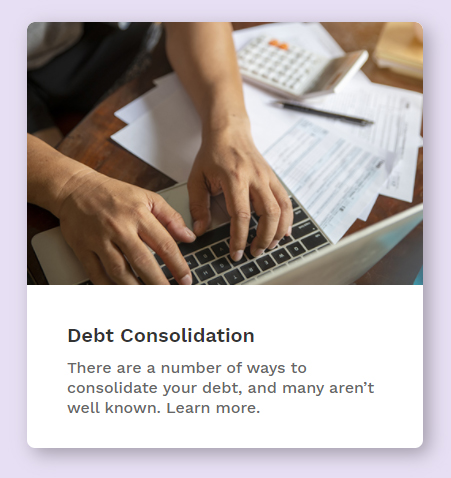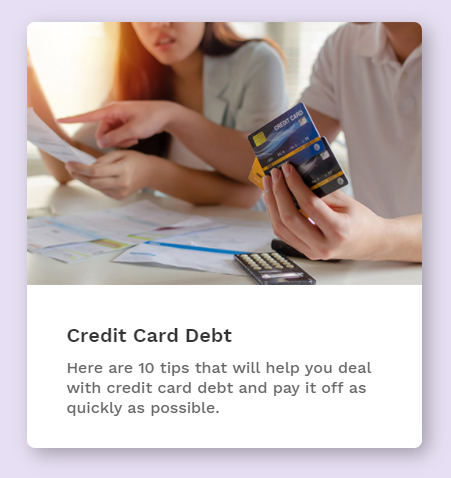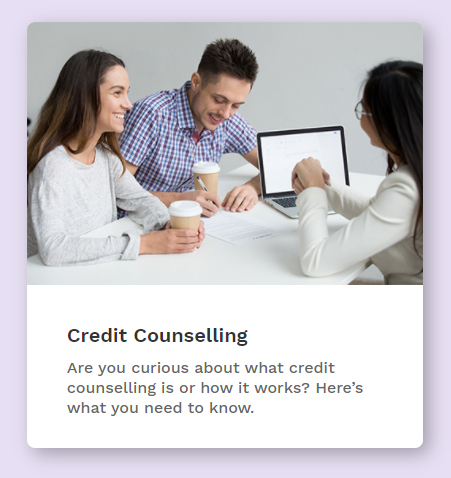Alternatives When You’re Declined for a Consolidation Loan and Need Debt Relief
By Carmen Chan
You’ve been denied a debt consolidation loan from your lender and you’re struggling to manage your debts. What do you do next to get the debt relief you need?
First, take solace in knowing you’re not alone. Consumer debt in Canada is at record highs, according to the credit reporting agencies, with personal loans eating up an ever-increasing share of our incomes. While it can feel like you have an insurmountable amount of money to pay back, there are ways forward.
If you’ve been rejected after trying to get a debt consolidation loan to gain control of your finances, don’t beat yourself up. Debt consolidation loans can be hard to qualify for. You need a solid credit score, steady income, and even collateral to insure your loan – all of which may be out of reach in your current circumstances.
There are other viable options available to you, though. Here’s a look at common debt relief options and programs in Canada to manage your debt load if you can’t secure a consolidation loan.
Outline Your Budget
One of the most important steps to take when you are trying to consolidate debt is to establish and live within a realistic household budget. A budget is simply a spending plan where you outline your priorities. If your budget is realistic, it will help you make ends meet so that you don’t go deeper into debt and can deal with what you already owe.
If you need help creating a budget, contact us now. We can off you a confidential, one-on-one appointment to review your financial situation or a webinar or workshop if you want more general information to get you started. We even have free, self-paced online budgeting and credit courses and resources if you’d rather give it another go on your own. Your choice; so don’t delay. Help is available, and you don’t need to struggle on your own.
What Happens When You Contact the Credit Counselling Society?
Debt Management Program
One of the smoothest ways to consolidate your debts and get in the front seat of your finances is through a Debt Management Program (DMP). A DMP is a voluntary arrangement that’s made between you, your creditors, and a non-profit credit counselling agency, such as us at the Credit Counselling Society.
Similar to a debt consolidation loan, it pulls together all of your unsecured debts, like your credit cards, payday loans, overdrafts, personal loans and lines of credit, creating one single payment so you can focus on paying what you owe instead of juggling multiple due dates and interest rates. Where a consolidation loan pulls your debts together, a DMP consolidates your payments. The end effect is almost the same, but there are some benefits with a DMP that a consolidation loan can’t offer.
A DMP is based on using existing money in your current budget, not borrowing more money, as you must do when you get a loan. One of our credit counsellors works closely with you to determine if a DMP is a good debt relief program or option for you. If it is, they will provide hands-on support to help you pay off your debts and learn about money management strategies that will keep you in the clear for years to come.
For all of our DMP clients, we work directly with creditors, who typically completely eliminate, or at least drastically reduce, the interest on your debts going forward, with the intention of you being debt-free within five years. Through the program, you’ll pay a single lump sum that’s then distributed to pay off your various outstanding debts.
Debt Settlement
With a debt settlement, you’re offering your creditors a lump sum of cash to settle your debts. You pay off a portion of what you owe and your creditors write off the difference. Depending on who pays the creditors, e.g. you or an agency, that will determine how long the information about the settlement stays on your credit report. Creditors don’t like to write debt off, but depending on your situation, despite the hit to your credit, it can be a good way to deal with your debts if you have a lump sum of money available to offer them.
A debt settlement can be brokered by you – you’d contact your creditors yourself, explain your situation, and offer them a settlement in cash. It’s important to treat all creditors fairly and proportionally. If they accept the debt settlement offer, you put the agreement in writing, you pay the creditors what they signed off on and agreed to, and you’ll no longer legally owe any funds. The information will stay on your credit history report for 6 – 7 years from when the payments were processed.
The Credit Counselling Society can also work on your behalf to set up a debt settlement. They aren’t easy to broker so there is a small fee, but you only pay the fee if we successfully make an arrangement with your creditors to settle all of your unsecured debts. Debt settlements paid through CCS are removed from your credit report 2 years after they payments have been processed.
Across the board, a debt settlement – whether arranged by us or on your own, will negatively impact your credit score even if you’re wiping your debts clean. Don’t let this deter you, though, if you need debt relief. You can start right away rebuilding your credit score.
Balance Transfer
While you may have been unsuccessful in getting a debt consolidation loan, you can still consolidate your debts through a credit card balance transfer. In this case, a balance transfer shifts all of your credit card debt onto a single credit card with a lower interest rate.
This is a worthy option if you’re offered a low interest rate balance transfer – some credit cards even have a zero percent interest introductory period, so you can start tackling your debts interest-free. Once you have the new card in hand, you’ll use it to pay off all of your debts, leaving you with a single credit card balance to manage. The balance transfer is sometimes included in the application for the new card so be sure to apply for that as you apply for the new card.
A balance transfer can be a good option as long as you cancel your other cards, so you don’t accumulate debt all over again. You’ll also save money because you’re no longer tied to the high interest on your old debts.
But before you proceed, make sure you look at the terms and conditions of the balance transfer card, including the ongoing interest rate after the introductory promotions end. You may find some cards come with incredibly steep interest rates after your grace period and a lengthy list of penalties if you’re late or miss payments. While it sounds easy, a credit card balance transfer can be one of the hardest ways to get the debt relief you need.
Get a Co-Signer or Some Collateral
If you don’t like the options above, you can improve your finances and try again with applying for a debt consolidation loan. Improving your financial situation could mean getting a higher paying job, taking on a second job, spending less, using your house to generate income, or sharing expenses with a roommate or partner.
Also clarify with the lender(s) why you were denied a consolidation loan the first time. Maybe your debts were too high, you had a bad credit score, or you didn’t have a steady income to prove you can manage payments.
These issues can be resolved. Stay on top of all of your debt repayments to boost your credit score and improve your credit history, showing lenders you are responsible with managing your accounts. If you’re able to pay down your debts before you apply again, that means you’ll be applying for a smaller debt consolidation loan in the future.
You can consider if a family member is willing to co-sign a consolidation loan or if you want to put your home or car up as collateral. It’s crucial that you recognize that either of these moves will put your family member’s financial situation or your assets on the line if you default on your loan, though. There are many ways a family member could help you, so rather than risk ruining your relationship, it might be better not to ask them to co-sign for you.
Pay Off Your Debts One-by-One
Finally, you can stick with the traditional route for getting debt relief – paying off each of your debts one-by-one until they’re all cleared up. Do this by targeting the debts with the highest interest rates first, freeing yourself as quickly as you can from excessive interest that’s driving up your outstanding balance.
Keep in mind, you must make the minimum payment on all of your accounts while paying extra to the debt with the highest interest rate, or you’ll face penalties. This strategy is often called the avalanche method, versus the snowball method that is just as effective.
What to Do When You Need Debt Relief and You’re Declined for a Consolidation Loan
While you may have been turned down for a debt consolidation loan, other routes to get relief from your debts are available. Your job is to choose the option that makes the most sense to you. If you’re worried you won’t be able to do this on your own, one of our credit counsellors can help you pave the way forward. Reach out to us sooner than later because the longer you wait, the more limited your options can be.
Last Updated on April 21, 2025







